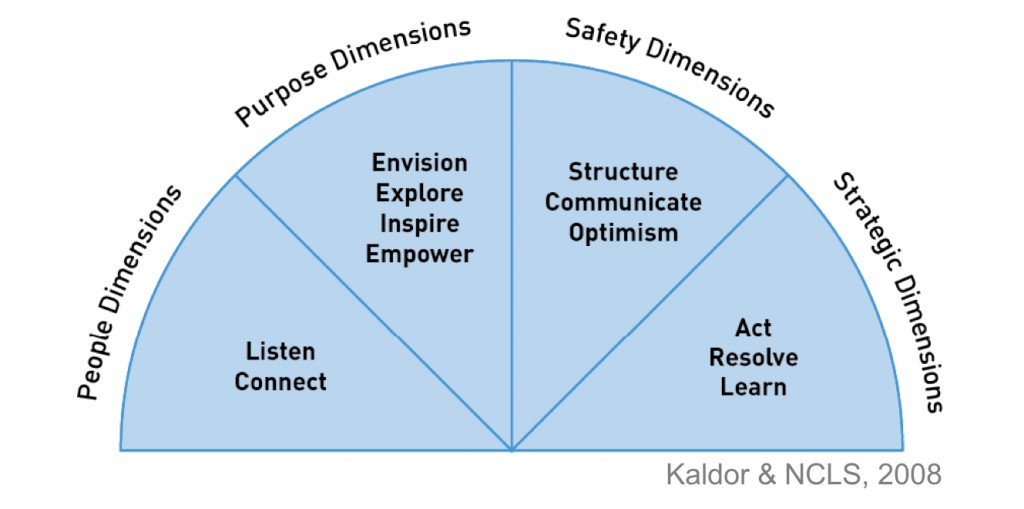The notion of leadership skills – whether in business or another professional sphere – is changing. Traditional ideas are being overturned in the contemporary world. But what’s taking its place to prevent organisations becoming rudderless? Which direction are effective leadership and management skills going in now?
Marcelle Droulers, Lecturer in Management at Charles Sturt University, has the answer.
How is leadership adapting to the modern world of work?
Ms Droulers points out that management thinking has been dominated by pervasive ideas for a long time. But some of these ideas are becoming less useful in the contemporary business context.
“The ‘commonsense’ idea that leaders have special personal attributes (traits) is being challenged. Early thinking about leadership focused on military and political leaders and identifying their unique traits: people either had the requisite traits to become a leader or they didn’t. Training focused on bringing out those traits, rather than engendering them in anyone.
“This old model of leadership was more aligned to command-and-control approaches to work. But most contemporary organisations don’t function along those lines. Traits don’t really tell you how to be a leader – especially how to be a leader in the contemporary workplace. This concept also tends to promote the idea that leaders are born and not made, which really isn’t the case. People can change behaviours and develop skills in order to become a better leader.”
Leadership instead of leaders
As Ms Droulers describes, in the modern world conceptions of leaders has changed significantly.
“The more contemporary thinking is to focus on leadership, rather than on individual leaders. What does a community, a team or an organisation need in terms of leadership rather than in terms of specific types of individuals?
“In this way of thinking, leadership isn’t just a privileged position for those who align with a pre-existing stereotype of what we expect a leader to look like. Now we are thinking about how to embed it throughout an organisation. Leadership becomes distributed across an organisation and this can be empowering for individuals, especially for those who don’t immediately consider themselves as ‘leaders’; this is sometimes called the ‘post-heroic perspective’.
“The expectation now is that people lead themselves as well as others and work more collaboratively than hierarchically.”
How can we develop effective leadership and management skills across organisations?
In this ‘culture of leadership’, rather than command-and-control systems, individuals are in a position to exercise initiative and guidance in less obvious ways and aligned to their unique strengths. As leadership becomes more distributed throughout an organisation, the prospects of everyone within it contributing is, as Ms Droulers explained, much greater.
“A good leader has a good balance of task behaviours – delegating, organisation, coordinating – and relationship skills. Facilitating social relationships within a team – through communication and so on – helps foster a positive group atmosphere. Anyone in the team can exhibit these skills to help achieve the collective goals. Every person’s skill set has the potential to inspire, and in a sense lead, others.”
There’s much more to the notion of leading than people might initially think, as Ms Droulers explained.
“Leadership is, of course, about completing projects and working with others. But it goes much further than that. It means keeping your team energised and motivated and heading in the same direction by sharing common vision and goals. More importantly, there is a strategic dimension that looks outwards and responds to rapidly changing conditions. I like to work the model developed by Kaldor, Nash and Paterson (2017). It invites organisations to shift their thinking and dependence on ‘superheroes’ by building leadership capacity throughout the organisation. Deep and sustainable change is difficult. This kind of thinking shows how to grow an agile and collaborative workplace culture that can meet this challenge.”

Source: Kaldor, P., Nash, N. & Paterson, S. (2017). Rethinking Leadership. Sydney: Thousand Lakes. rethinkingleadership.com.au
Everyone can lead by example
Contemporary organisations are, Ms Droulers points out, increasingly recognising the individual strengths people can bring to teams and projects.
“If we all try to conform to a stereotypical image of leadership, we don’t play to our personal strengths. If you have influence over projects and people, utilising your skills and knowledge, you are leading.
“You don’t have to be a manager to be a leader. You need to be self-reflective and recognise your strengths and weaknesses, and create a narrative around your strengths that others can get behind. People connect with values and vision. Leadership is created by people and teams, rather than it just being imposed from the top down.”
Do you want to develop your effective leadership and management skills?
Everyone can benefit from developing new skills. At Charles Sturt University, you can undertake single subject study in Contemporary Issues in Leadership to boost your skills for leadership and management and your career prospects. Then, if you want to take your studies further, you can move on to the Master of Social and Organisational Leadership (and possibly get recognition of prior learning for your single subject).
Get in touch to discuss how you can make your next move count.


You must be logged in to post a comment.